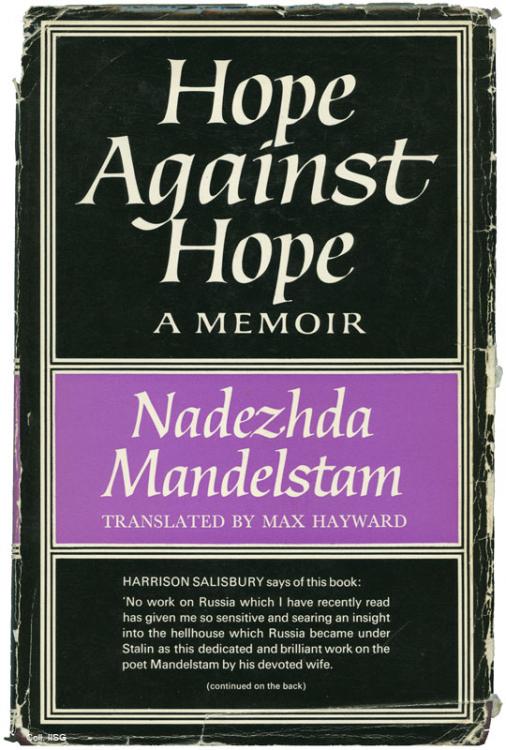Nadezhda Mandelstam: Hope Against Hope: A Memoir (1970) [RU, EN]
Filed under book | Tags: · 1930s, avant-garde, biography, history, history of literature, literature, memory, poetry, politics, russia, soviet union, totalitarianism

“Nadezhda Mandelstam’s memoir of her life with poet Osip, who was first arrested in 1934 and died in Stalin’s Great Purge of 1937-38. The book is a vital eyewitness account of Stalin’s Soviet Union and one of the greatest testaments to the value of literature and imaginative freedom ever written.”
Publisher Chekhov Publishing Corp., New York, 1970
432 pages
English edition
Translated by Max Hayward
With an Introduction by Clarence Brown
Publisher Atheneum, New York, 1970
Fifth printing, 1983
ISBN 0689705301
xvi+432 pages
Reviews: George Ivask (Slavic Review, 1971), Simon Karlinsky (Slavic and East European Journal, 1971), Robert P. Hughes (Russian Review, 1971), Seamus Heaney (London Review of Books, 1981), Elaine Feinstein (The Independent, 2013).
Commentary: Judith Robey (Slavic and East European Journal, 1998).
Vospominaniya (Russian, 1970/1999, TXT; HTML)
Hope Against Hope (English, 1970/1983, PDF/42 MB; DJVU/7 MB)
Common Knowledge 17(1): Comparative Relativism: Symposium on an Impossibility, I-IV (2011)
Filed under journal | Tags: · anthropology, comparative relativism, ethnography, history, knowledge, philosophy of science, politics, science, sociology of science

A journal section based on the conference “Comparative Relativism” held in September 2009 at the IT University of Copenhagen.
The aim of this publication “is to place in unlikely conjunction the two terms ‘comparison’ and ‘relativism’. On the one hand, comparison, in the most general sense, involves the investigation of discrete contexts to elucidate their similarities and differences. Comparative methods have been widely used in many social science disciplines, including history, linguistics, sociology, and anthropology. On the other hand, relativism, as a tendency, stance, or working method in social anthropology, and more recently in science and technology studies (STS), usually involves the assumption that contexts exhibit, or may exhibit, radically different, incomparable, or incommensurable traits.”
Based on this paradoxical premise, “comparative relativism is understood by some to imply that relativism comes in various kinds and that these have multiple uses, functions, and effects, varying widely in different personal, historical, and institutional contexts; moreover, that those contexts can be compared and contrasted to good purpose…On the other hand, comparative relativism is taken by other[s] to imply and encourage a ‘comparison of comparisons’, in order to relativize what different peoples—say, Western academics and Amerindian shamans—compare things “for’.” (from the Introduction)
“In other words, comparative relativism can ask both what knowledge or truth is being imagined relative to and whether comparison always operates in the “same” way—or with the same grounds or purposes (e.g., shoring up the categories of culture, nature, morality) wherever we find it.” (from Helmreich 2012)
With contributions by Casper Bruun Jensen, Barbara Herrnstein Smith, G. E. R. Lloyd, Martin Holbraad, Andreas Roepstorff, Isabelle Stengers, Helen Verran, Steven D. Brown, Brit Ross Winthereik, Marilyn Strathern, Bruce Kapferer, Annemarie Mol, Morten Axel Pedersen, Eduardo Viveiros de Castro, Matei Candea, Debbora Battaglia, and Roy Wagner.
Publisher Duke University Press, Winter 2011
ISBN 0961-754x
165 pages
PDF (4 MB)
See also
Casper Bruun Jensen, Bifurcations: Comparative Relativism, Conexões Parciais, 2012, 21 pp.
Stefan Helmreich, Extraterrestrial Relativism, Anthropological Quarterly, 2012, 15 pp.
J. R. McNeill, Corinna R. Unger (eds.): Environmental Histories of the Cold War (2010)
Filed under book | Tags: · climate, cold war, ecology, environment, geopolitics, history, military, nuclear weapons, politics, war, war studies

“This book explores the links between the Cold War and the global environment, ranging from the environmental impacts of nuclear weapons to the political repercussions of environmentalism. Environmental change accelerated sharply during the Cold War years, and so did environmentalism as both a popular movement and a scientific preoccupation. Most Cold War history however entirely overlooks these developments, which were not only simultaneous but also linked together in ways both straightforward and surprising. The contributors to this book present these connected issues as a global phenomenon, with chapters concerning China, the USSR, Europe, North America, Oceania, and elsewhere. The role of experts as agents and advocates of using the environment as a weapon in the Cold War or, contrastingly, of preventing environmental damage resulting from Cold War politics is also given broad attention.”
Publisher Cambridge University Press, 2010
ISBN 0521762448, 9780521762441
362 pages
Reviews: Chaney (H-Net, 2011), Tucker (Michigan War Studies Review, 2012), Kinkela (Cold War History, 2013).
Conference report by Thomas Robertson (GFI Bulletin, 2007)
PDF (5 MB, updated on 2019-10-11)
Comment (0)
